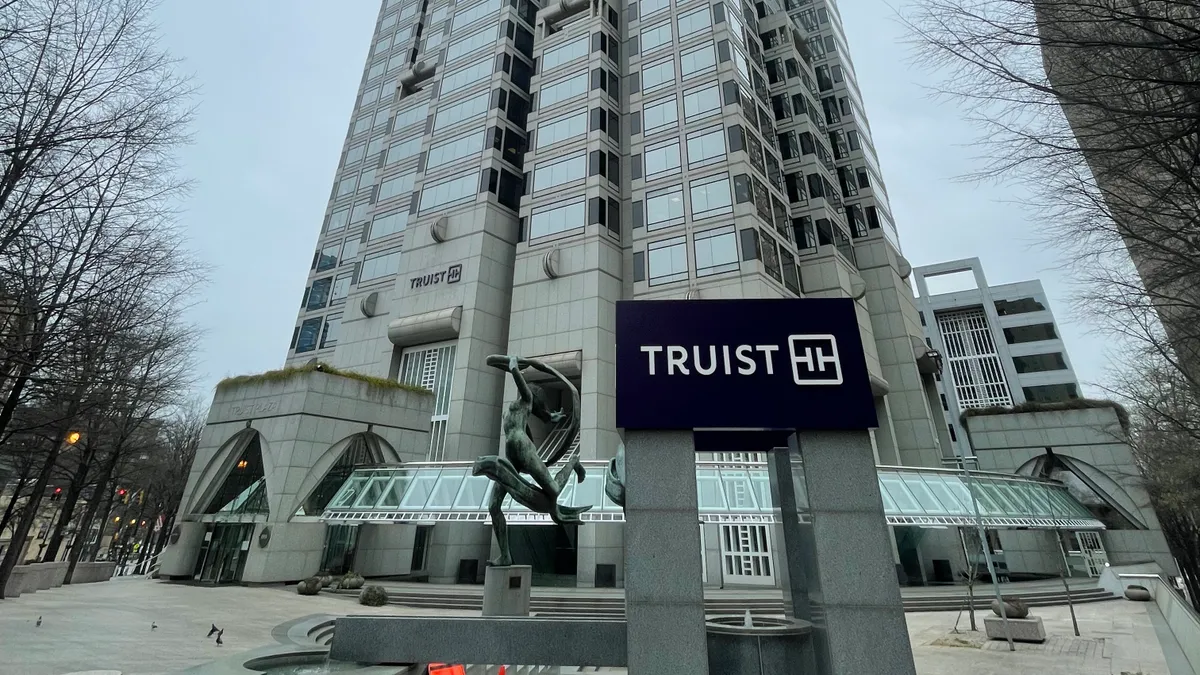Dive Brief:
- Truist is giving CFO Mike Maguire and Dontá Wilson, the bank’s chief consumer and small-business banking officer, “leadership awards” valued at $4.5 million, according to a Friday filing with the Securities and Exchange Commission.
- The awards, in the form of performance share units, were given “to support the retention of key leadership critical to taking full advantage of the business opportunities” created by the sale of Truist Insurance Holdings, the filing said. Both executives serve on the Charlotte, North Carolina-based bank’s operating council.
- The bonuses for Maguire and Wilson are among changes the bank’s human capital committee made to its executive compensation program, in connection with a “strategic planning process” the bank launched last September, highlighted by an aim to cut costs by $750 million over 12 to 18 months.
Dive Insight:
To determine bonus size for Maguire and Wilson, the committee “took into account the executive’s expected contribution to the success of the Company, the holding power of the executive’s outstanding equity awards in an increasingly competitive environment, the executive’s total target direct compensation, and the executive’s skill set and attractiveness in the market for talent,” the filing said.
Maguire’s compensation amounted to $3.6 million last year, according to the bank’s most recent proxy filing. Maguire, who joined Truist predecessor SunTrust in 2001, became CFO in September 2022. Wilson, whose compensation amounted to $4.7 million last year, spent about 24 years with BB&T prior to its 2019 merger with SunTrust, and has held his current title since last November, according to his LinkedIn profile.
Payout of the awards is subject to Truist achieving minimum capital requirements, and a modifier based on total shareholder return relative to the KBW Nasdaq Bank Index. Each will be measured through Aug. 31, 2027. The metric will result in a payout between 75% and 125% of target, if the minimum capital requirements have been met, the filing noted.
The committee also can reduce the payouts “based on business factors and negative risk outcomes, including industry conditions, performance relative to peers, regulatory developments, and changes in capital requirements,” the filing said.
While the one-time equity awards represent Truist’s investment in some executives, the bank has seen several C-suite departures over the past year, including its chief information officer, chief audit officer and chief marketing officer. Last week, Truist said Allison Robinson, the lender’s head of branch and premier banking, left the company after more than two decades with BB&T and then Truist.
Sometimes such executive bonuses face pushback, such as with JPMorgan Chase awarding CEO Jamie Dimon a $52 million bonus two years ago. Other times, they work in a bank’s favor, such as with Morgan Stanley giving CEO contenders Andy Saperstein and Dan Simkowitz $20 million bonuses to retain them even though they weren’t picked for the job.
Maguire and Wilson’s awards are “designed to place a specific emphasis on shareholder value creation while still incentivizing these executives to maintain appropriate levels of capital and appropriately manage risk,” the filing said.
In February, the bank’s compensation and human capital committee decided to shift from its historical annual incentive performance award program, which based bonuses on three components and relative weightings, to one that “emphasizes a comprehensive evaluation of performance across multiple categories.”
Those include financial measures such as adjusted earnings per share, adjusted noninterest expense, common equity tier 1 capital ratio, adjusted net income to common shareholders, and efficiency ratio. It also factors in “non-financial strategic priority categories” such as “Simplify and Optimize Resources and Controls,” and “Winning Behaviors.”
Truist CEO Bill Rogers said in July the bank is “fully committed” to its goal of keeping expenses flat this year compared to 2023, although the lender is investing in certain areas of the business such as payments and middle-market lending.














